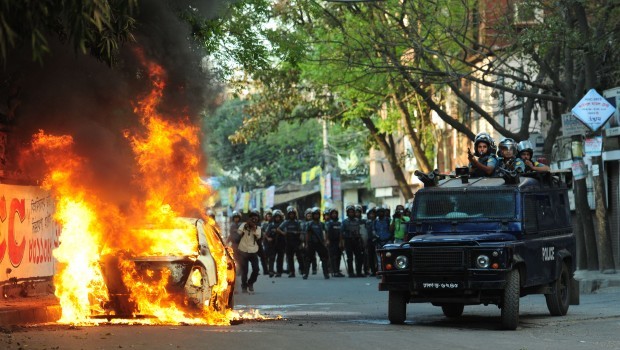
TOPSHOTS Bangladeshi police drive past a burning car during clashes between police and activists on the streets of Dhaka on March 2, 2013. (AFP PHOTO/ STR)
Dhaka, Reuters—Bangladesh deployed troops on Sunday to a town where eight people were killed in clashes between police and Islamist party supporters protesting against the conviction of party leaders on charges stemming from the country’s 1971 independence war.
Bangladesh has been rocked by protests and counter-protests since January, when a tribunal set up by the government to investigate abuses during the war of independence against Pakistan handed down its first conviction, sentencing a leader of the Jamaat-e-Islami party in absentia to death.
Jamaat-e-Islami opposed Bangladeshi independence from Pakistan in the 1971 war. The authorities have accused several of its leaders of committing atrocities including rape and murder during the conflict, which the party denies.
About 60 people, including six policemen, have been killed in protests since the tribunal’s third conviction on Thursday, when another member of the Islamist party, Delwar Hossain Sayedee, 73, was sentenced to death.
He denied charges of atrocities including rape and murder, and his lawyer said he would appeal.
On Sunday, the government appealed to have a life-imprisonment sentence on another Jamaat leader, Abdul Quader Mollah, replaced by a death sentence. Many Bangladeshis, mostly youths, have staged street protests for a month demanding the death penalty for Mollah and others facing war crimes charges.
On February 17, parliament amended a law allowing the state to appeal any verdict in war crimes trials it deems inadequate.
“SAYEDEE ON MOON”
Thousands of Jamaat-e-Islami activists took to the streets of Bogra town, 220 km (140 miles) north of the capital, Dhaka, on Sunday and attacked police with crude bombs, swords and sticks, police and witnesses said.
They stormed a police station, set fire to houses including those of leaders of the ruling Awami League party and minority Hindus, and pulled away train lines disrupting rail services in several districts, police and reporters said.
“We had to open fire after rubber bullets and teargas failed to disperse the attackers,” police officer Atiur Rahman told Reuters over phone from Bogra.
An army spokesman in Dhaka said two platoons of troops had been deployed in Bogra, where eight people, of them three women, were killed on Sunday. Eight others, including a policeman, died in clashes elsewhere and scores were wounded, according to reports from police.
In some places, authorities imposed a ban on public gatherings in fear of more violence and ordered stepped up night patrols by security forces.
RIVAL WOMEN
Bogra is a political stronghold of Begum Khaleda Zia, head of the main opposition Bangladesh Nationalist Party (BNP) and arch rival of Prime Minister Sheikh Hasina.
The two women have shaped the country’s politics since 1991, both serving terms as prime minister followed by spells in opposition. They routinely accuse each other of political vengeance and provoking violence.
Sunday was the first day of a three-day strike called by the Jamaat-e-Islami and the BNP.
Hasina set up the tribunal in 2010 to investigate abuses during the war, in which Bangladeshi authorities say about 3 million civilians were killed. Thousands of women were raped.
The two opposition parties say the prime minister is using the tribunal to persecute them. The government denies that and says justice must be served.
The tribunal has been criticised by rights groups for failing to adhere to international standards. Human Rights Watch said lawyers, witnesses and investigators reported they had been threatened.
Bangladesh became part of Pakistan at the end of British colonial rule in 1947. The country, then known as East Pakistan, won independence with India’s help in December 1971 following a nine-month war against the rest of Pakistan.
Some factions in Bangladesh opposed the break with Pakistan, including the Jamaat-e-Islami.
The overwhelmingly Muslim south Asian country of 160 million people is likely see more violence in the run-up to parliamentary elections in January, in which both Hasina and Khaleda will again compete for power.
